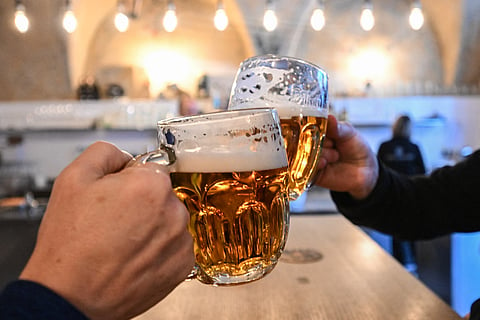
- NEWS
- the EDIT
- COMMENTARY
- BUSINESS
- LIFE
- SHOW
- ACTION
- GLOBAL GOALS
- SNAPS
- DYARYO TIRADA
- MORE

Gabriela Galetkova, a media consultant, frequents a local pub several times a week to meet friends, hoping to preserve the essence of Czech beer culture, which has been struggling in recent years as pub visits decline.
"I won't buy beer to drink at home. For me, Czech beer culture is about meeting people in a typical Czech pub," said the 54-year-old in a Prague bar serving the country's iconic Pilsner lager.
Though many Czech beer drinkers are turning away from pubs—often due to rising costs — local beer professionals are pushing for international recognition from UNESCO, seeking to boost the country's beer heritage.
Tomas Slunecko, head of the Czech Beer and Malt Association, believes the tradition of Czech beer culture deserves a spot on the United Nations' intangible heritage list. "Wherever you go in Europe or the world, people ask you about Czech beer," said Slunecko, a former diplomat.
If successful, the Czech beer culture would join Belgium, which earned a UNESCO designation in 2016. Slunecko believes Belgium's recognition enhanced both its national and international beer reputation.
Earlier this year, the Czech culture ministry added beer culture to the national list of cultural heritage, marking a necessary step before seeking UNESCO recognition. Slunecko and his colleagues are now working to promote the bid.
Tradition at a crossroads
Czech beer-making has a history spanning more than a thousand years, with local lagers gaining global recognition. The country is home to more than 550 breweries, including 500 small ones that have emerged in the past two decades.
Czech breweries employ 65,000 people and produce about 20 million hectolitres of beer annually, exporting a quarter of it to countries like Germany, Poland, Slovakia, and Hungary. Despite its rich brewing tradition, Czech drinkers are spending less time in pubs.
Beer consumption in the country remains among the highest globally at 128 litres per person in 2023, but this figure marks a decline from 143 litres a decade ago, according to Slunecko. Rising beer prices—partly due to tax hikes and higher production costs—have made beer more expensive, with a pint of Pilsner Urquell in Prague costing around CZK 70 ($3). As a result, more drinkers are opting for cheaper bottled beer from supermarkets.
The COVID-19 pandemic exacerbated the trend, as pubs closed and foreign tourism plummeted, leading to fewer people visiting bars. The Czech Chamber of Commerce reported that 15 percent of local pubs closed during the pandemic, and another 15 percent changed ownership. Smaller towns and villages now lack places to enjoy a pint, contributing to the decline.
"The share of beer consumed in pubs and at home used to be 50-50. At present, pubs only account for 30 percent," Slunecko noted. He added that a shift toward healthier lifestyles and a preference for online socializing are contributing factors.
As 'social networks'
Despite these challenges, sociologist Jiri Vinopal argues that Czech pubs are vital social spaces, helping to keep communities connected. Vinopal, who has been researching Czech pub culture since 2004, emphasizes that beer culture plays a key role in building national and local identities.
Slunecko remains hopeful, noting that women are increasingly visiting pubs, attracted by improvements in pub quality, variety of drinks, and food offerings. "It's about quality replacing quantity," he said, likening Czech pubs to "social networks."
"A pub is a pleasant place to meet. And there's nothing wrong about drinking beer," he concluded.
